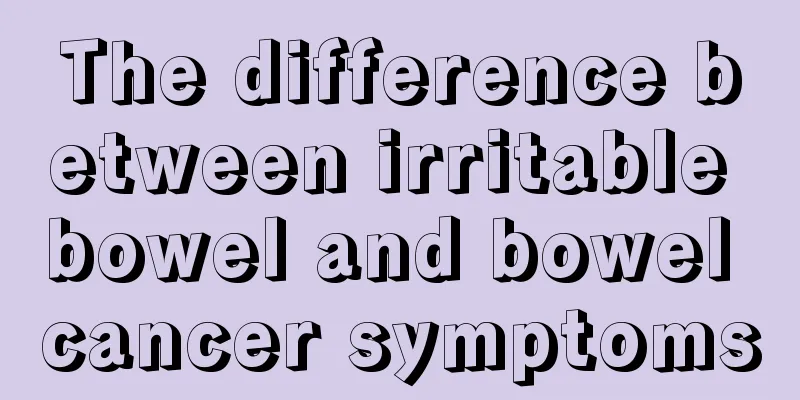The difference between irritable bowel and bowel cancer symptoms

|
There are obvious differences in the symptoms of irritable bowel syndrome (IBS) and colorectal cancer. IBS is mainly manifested by abdominal pain, bloating, diarrhea or constipation, while colorectal cancer may be accompanied by symptoms such as weight loss, blood in the stool, and anemia. IBS is usually not life-threatening, but colorectal cancer requires prompt medical treatment. 1. Symptoms of Irritable Bowel Syndrome Irritable bowel syndrome is a functional intestinal disease with symptoms such as abdominal pain, bloating, diarrhea or constipation, and these symptoms are usually related to defecation. Abdominal pain may be relieved after defecation, and symptoms may recur, but will not lead to weight loss or blood in the stool. The cause of irritable bowel syndrome may be related to factors such as increased intestinal sensitivity, intestinal flora imbalance, and psychological stress. In terms of treatment, symptoms can be improved by adjusting diet such as a low FODMAP diet, taking probiotics, and relieving stress. 2. Symptoms of Bowel Cancer The symptoms of colorectal cancer are usually more serious and may include blood in the stool, weight loss, anemia, persistent abdominal pain, or changes in bowel habits such as alternating diarrhea and constipation. Blood in the stool may be bright red or dark red, and weight loss and anemia may be related to the tumor consuming nutrients in the body. The cause of colorectal cancer may be related to factors such as genetics, long-term inflammatory bowel disease, and a high-fat, low-fiber diet. In terms of treatment, early colorectal cancer can be removed surgically, while mid- and late-stage colorectal cancer may require a combination of chemotherapy, radiotherapy, and other comprehensive treatments. 3. How to distinguish between irritable bowel syndrome and colon cancer The symptoms of irritable bowel syndrome are usually mild and not accompanied by weight loss or blood in the stool, while the symptoms of colorectal cancer are more severe and persistent. If you experience blood in the stool, weight loss or persistent abdominal pain, you should seek medical attention for a colonoscopy to confirm the diagnosis. Colonoscopy is a key means of distinguishing the two, and it can visually observe whether there are tumors or other lesions in the intestine. There are significant differences in the symptoms of irritable bowel syndrome and colorectal cancer. Irritable bowel syndrome is usually not life-threatening, but colorectal cancer requires prompt medical treatment. If you experience blood in your stool, weight loss, or persistent abdominal pain, you should undergo a colonoscopy to rule out the possibility of colorectal cancer. Early detection and treatment of colorectal cancer can significantly increase the cure rate, so regular screening is particularly important for high-risk groups such as those with a family history or long-term inflammatory bowel disease. |
<<: Symptoms of secondary chondrosarcoma
>>: Can women with kidney cancer have children?
Recommend
What kind of drinks do you usually drink when you go to a bar
In life, many people like to go to bars, especial...
Can regular urination prevent bladder cancer? What causes bladder cancer?
Bladder cancer refers to a malignant tumor that o...
What are the misunderstandings people have about kidney cancer?
People often mistakenly believe that once kidney ...
If one side of the stool is yellow and the other side is brown, does it mean colon cancer?
If one side of the stool is yellow and the other ...
The harm of cervical spine in radiotherapy for nasopharyngeal carcinoma
Radiotherapy in various hospitals is generally th...
What harm does nuclear radiation do to the human body
The environment we live in is getting worse and w...
What are the dangers of using a hand gripper?
A hand gripper, also known as a wrist strengthene...
Is my butt itchy due to parasites?
The anus is also an area that is vulnerable to ba...
Can genetic factors induce skin cancer?
Can cancer be inherited? This is something that m...
Can white vinegar cure hemorrhoids?
Hemorrhoids are not unfamiliar to office white-co...
Analyze the main causes of rectal cancer for everyone
It is understood that many people do not pay atte...
What is the difference between an indwelling needle and a regular needle?
Everyone must be familiar with indwelling needles...
There is a white hard lump on the sole of my foot
A white hard lump on the sole of the foot may be ...
How to clean new tea sets before use?
Many people like to drink tea. We all know that d...
One-year-old girl always scratches her private parts?
No matter it is a boy or a girl, parents must pay...









